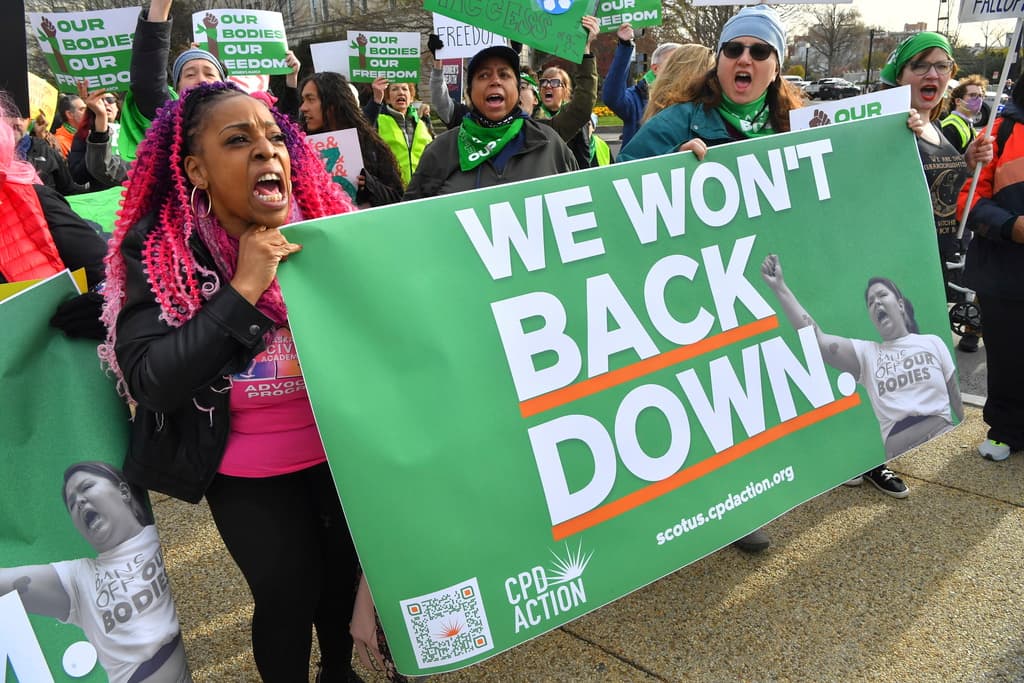More abortions are being performed in the USA – despite a total ban in nearly every third state. Since the right to free abortion was abolished and about 60 clinics were forced to close, the number of abortions has skyrocketed.
The availability of online services has revolutionized abortion care, says researcher Caitlin Myers.
Two years have passed since the US Supreme Court chose to overturn the ruling that gave women across the country the right to free abortion since the 1970s. Anti-abortionists rejoiced, and strict abortion laws were quickly introduced from Idaho to Tennessee.
Abortion is now totally banned in 14 states, and in some cases, no exceptions are made even in cases of rape or incest. Another four states – Florida, Georgia, South Carolina, and Iowa – allow abortion only before the sixth week of pregnancy.
One in five chooses home abortion
But figures from the Guttmacher Institute show that more American women are terminating their pregnancies today than ten years ago. Last year, over a million abortions were performed across the USA, and between 2020 and 2023, the number increased by 11 percent.
One of the explanations is increased access to online services, according to economist Caitlin Myers:
I would call it a "game changer". Now it's fully possible for women living in states where abortion is banned to consult a doctor online and then receive the medication at home, she says.
One in five abortions in the USA is now performed through online services. The breakthrough came last summer when several states where abortion is allowed introduced laws making it possible for healthcare providers to send abortion pills to patients far beyond state borders. Doctors in Colorado, Massachusetts, New York, Washington, Connecticut, California, and Vermont can now help women in Texas perform a medical abortion – entirely legally.
I don't want to downplay the fact that many women are affected by the abortion bans, absolutely not. We see a significant inequality in access to care, and it's primarily low-income women who are affected, says Myers.
At the same time, there's a new, safe, and effective method, so we're not back in a time when the only alternative was a coat hanger.
Court ruling behind the increase
Myers is active at Middlebury University in Vermont and has been mapping access to abortion care for many years. Her research shows that the distance to a physical clinic performing abortions has increased for many Americans, especially in the southern USA.
Residents of southern Florida, for example, must travel an average of 120 miles to get an abortion after the tenth week of pregnancy.
For the vast majority, the abortion bans haven't had a significant impact. Those who have the economic means to travel have done so, and we've seen a significant influx of patients in, for example, New Mexico and Kansas, which have more generous legislation.
For economically disadvantaged women, the situation is more difficult. Myers' research points out that it's precisely low-income earners who are affected by the restrictive abortion laws that have been introduced. Black women are also affected to a greater extent than white women, she emphasizes.
Driven on
But at the national level, access to abortion care has improved.
Interestingly, the decision to repeal the national abortion right and let states decide for themselves hasn't led to fewer abortions. On the contrary, it seems to have driven the increase we're seeing, says Myers.
The medication mifepristone, used in medical abortions, is approved in the USA up to the tenth week of pregnancy. Medical abortions are considered effective and very safe, but complications can occur.
Lauren Jacobson, a nurse who sends abortion pills from a clinic in Massachusetts, tells The Washington Post that they guide their online patients if they need to seek care after a home abortion.
We try to guide them to healthcare facilities where they can feel safe, she says.
National ban next?
Now, voices are being raised in the USA for more restrictive use of mifepristone. Restricting access to abortion pills would have a devastating effect, Myers believes.
All online services would essentially shut down. It would be a much harder blow than the Dobbs case, she says, referring to the court case that led to states introducing local abortion legislation.
The question of restricting mifepristone has been on the Supreme Court's agenda.
If you want to liken the abortion debate to a war, then Dobbs was far from the last battle. Anti-abortionists have fought for 50 years to repeal the national abortion right, and now the next step is a national ban, says Myers.
It would redraw the entire playing field completely.
The states of Idaho, North Dakota, South Dakota, Missouri, Indiana, West Virginia, Kentucky, Tennessee, Alabama, Mississippi, Louisiana, Arkansas, Oklahoma, and Texas have introduced total bans on abortion.
In Florida, Georgia, South Carolina, and Iowa, abortion is allowed up to the sixth week of pregnancy, which is only two weeks after a missed period.
In North Carolina and Nebraska, abortion is allowed up to week 12, and in Utah and Arizona, it is currently possible to get an abortion up to the 18th week of pregnancy.
22 of the USA's 50 states have restricted access to abortion care. Only 28 states – primarily on the east and west coasts – have abortion legislation similar to Sweden's.
Figures from the Pew Research Institute show that there is strong public support for the right to abortion.
Source: Guttmacher Institute, CNN, Pew Research Center
The number of abortions increased sharply in the USA after 1973, when the Supreme Court ruled that all women, regardless of where they live in the country, have the right to free abortion.
Since 1995, when around 1.6 million abortions were performed, the number of terminated pregnancies has decreased.
2017 was a turning point when the number of abortions began to increase again.
Source: Guttmacher Institute






